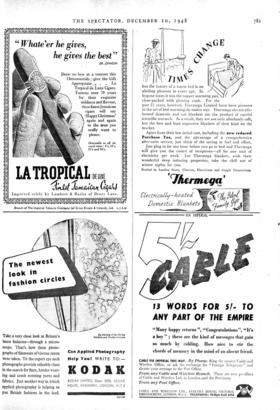Duhamel's Autobiography
Light on My Days. An Autobiography. By Georges Duhamel. Trans- lated by Basil Collier. (Dent. 15s.) READERS of M. Duhamel's novels will not be disappointed with this translation of the first two volumes of his autobiography. The author of The Pasquier Chronicles brings the same sensibility and understanding of human beings—so characteristic a quality in his novels—to the delineation of his own life story. Why is it that French writers have the gift, so singularly lacking in most contem- porary English ones, of being able to write movingly and sincerely about themselves and their work ? There is nothing self-conscious about M. Duhamel's autobiography. It is engagingly frank, beauti- fully written and often profound.
At the beginning of this book this French novelist admits that he finds it difficult to disentangle his imaginary world from reality. He writes :
" I have two sorts of memories, those of real life and those of my imaginary lives. If I do not find a way of assigning to each its territory and its limits, my imaginary memories will end by putting the others to rout and annihilating them."
In these opening chapters he gives a fascinating insight into the manner in which a creative artist draws his material from the world around him and of how the novelist also comes to believe in the imaginary places and characters that he has invented. M. Duhamel declares that his own father was like the one that he created for the Pasquier family but that the novelist in him changed many characteristics. As the book progresses the author also shows how various friends and acquaintances became the material for characters in the earlier novels, Vie et Aventures de Salavin.
family Duhamel faiily were not well off, but they led an adven- turous, interesting life. This was due to the remarkable personality of Georges Duhamel's father, Pierre-Emile Duhamel, who was per- petually changing jobs but whose whole life was buoyed up by an incurable optimism. This man, whose son reports that he remarked one day when discussing his ambitions : " President of the Republic ? Why not ? Tell me that I " had a passion for medicine and especially for the use of drugs. He passed on this enthusiasm for doctoring to his novelist son, and a great part of this early portion of the autobiography describes Georges Duhamel's studies to become a doctor and his youthful medical experiences. The family was forever on the move, and Madame Duhamel, who seems to have been a clever, economical housewife, is continually changing homes. First they are at Le Havre ; then in Paris ; then back in the country, and finally back in Paris. The writer describes this family back- ground with humour and tenderness, and his prose evokes a sympa- thetic picture of life in France at the end of the nineteenth and the beginning of the twentieth centuries. Writing during the days of the Occupation, M. Duhamel obviously looks back with nostalgia on the past security and prosperity of his country. Light On My Days, however, is chiefly remarkable for the informa- tion that it gives about the early life and formative period of one of France's greatest living writers. Georges Duhamel emerges from these pages as a man with a deep-felt sympathy for his fellow human beings, a man who craves for and has found friendship, and as a writer who has faith in God and man. These two volumes end with the young Duhamel, already a doctor, about to embark on the world of letters. It is to be hoped that the publishers will give us the other volumes which have already appeared in France. DEREK PATMORE.














































 Previous page
Previous page